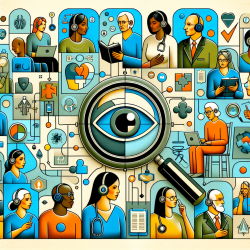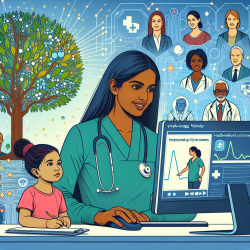Introduction
In the fast-paced world of healthcare, continuous education is crucial for improving patient outcomes. Delirium, a common disorder in older hospitalized patients, often goes unrecognized due to a lack of knowledge and skills among healthcare workers. The research article titled "The effect of an interactive delirium e-learning tool on healthcare workers’ delirium recognition, knowledge and strain in caring for delirious patients: a pilot pre-test/post-test study" highlights the potential of e-learning tools in enhancing the recognition and management of delirium.
Research Overview
The study conducted by Detroyer et al. (2016) involved 59 healthcare workers from various units of a university hospital. The intervention consisted of an e-learning tool with 11 modules designed to improve knowledge and skills in delirium prevention, detection, and management. The tool was available for two months, allowing participants to engage in self-directed learning.
Key Findings
- Improved Delirium Recognition: The study found a significant improvement in the recognition of both hypoactive and hyperactive delirium among participants who completed the modules.
- Enhanced Knowledge: Participants showed a marked increase in their knowledge about delirium, with higher scores in the post-test phase compared to the pre-test phase.
- Strain Levels: Despite improvements in recognition and knowledge, the study did not find a significant change in the strain experienced by healthcare workers when caring for delirious patients.
Implications for Practice
The findings suggest that e-learning can be an effective tool for improving healthcare workers' knowledge and recognition of delirium. However, the study also highlights the importance of module completion, as those who completed more modules showed greater improvements.
For practitioners looking to enhance their skills, incorporating e-learning tools into their professional development plans could be beneficial. Here are some steps to consider:
- Engage with E-Learning: Dedicate time to complete all modules of an e-learning tool to maximize learning outcomes.
- Apply Knowledge: Integrate new knowledge into daily practice by identifying delirium symptoms early and implementing appropriate interventions.
- Encourage Team Learning: Promote the use of e-learning tools among colleagues to foster a collaborative learning environment.
- Seek Feedback: Regularly assess the effectiveness of e-learning tools and seek feedback to improve future training sessions.
Conclusion
The study underscores the potential of e-learning tools in enhancing delirium care. While improvements in knowledge and recognition were evident, the lack of change in strain levels suggests that further research is needed to explore additional factors influencing care strain. Practitioners are encouraged to utilize e-learning as part of a broader educational strategy to improve delirium management.
To read the original research paper, please follow this link: The effect of an interactive delirium e-learning tool on healthcare workers’ delirium recognition, knowledge and strain in caring for delirious patients: a pilot pre-test/post-test study.










